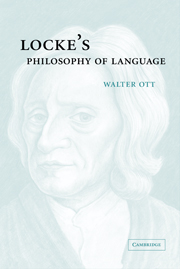Book contents
- Frontmatter
- Contents
- Acknowledgements
- Note on textual references
- Introduction
- 1 Signs and signification
- 2 Particles and propositions
- 3 Essence and abstraction
- 4 Locke contra the Aristotelians: signification and definition
- 5 Beyond the bounds of sense?
- 6 The reception of Locke's philosophy of language
- 7 Conclusion
- Bibliography
- Index
3 - Essence and abstraction
Published online by Cambridge University Press: 22 September 2009
- Frontmatter
- Contents
- Acknowledgements
- Note on textual references
- Introduction
- 1 Signs and signification
- 2 Particles and propositions
- 3 Essence and abstraction
- 4 Locke contra the Aristotelians: signification and definition
- 5 Beyond the bounds of sense?
- 6 The reception of Locke's philosophy of language
- 7 Conclusion
- Bibliography
- Index
Summary
Thus far, we have seen that for Locke, categorematic words signify ideas. The simple ideas given in sensation and reflection are all perfectly determinate, not only because their content is so, but also because each simple idea includes a “determination” to the particular time and place at which it was experienced (III.iii.6: 411). At first sight, this seems odd, as if each idea bore a sort of time-stamp linking it to the occasion on which it was given in sensation. Instead, Locke's point is that each simple idea is intromitted by the senses along with a number of other ideas, all of which together will determine that idea to a particular experiential context. If we had access only to such ideas, we would be correspondingly limited to thinking only about particulars. This is precisely the predicament of non-human animals, which, Locke suggests, are fully capable of reasoning. Pace Descartes, they are not mere automata; they can reason, but their reasoning is limited to particulars (II.xi.11: 160).
What is more, since each person's sensory and reflective ideas are determinate in both of the senses we have specified, limitation to particulars would make us unable to communicate. It would be impossible for different persons, each having distinct experiential histories, to use a word to signify the same idea (III.iii.3: 409–10).
To remedy this predicament, Locke posits abstract ideas. But it is important to see that his discussion of abstraction is also an episode in his general anti-Aristotelian project.
- Type
- Chapter
- Information
- Locke's Philosophy of Language , pp. 53 - 77Publisher: Cambridge University PressPrint publication year: 2003



